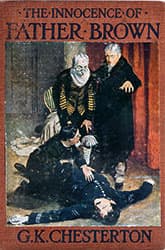The Innocence of Father Brown
Critique Quotes Text Father Brown at the movies
 First edition
First editionFirst publication
1911
Literature form
Story collection
Genres
Crime, mystery
Writing language
English
Author's country
England
Length
approx. 87,000 words

Father Brown (Mark Williams) investigates with friends Sid, Lady Felicia and Mrs. McCarthy.
The popularity of Father Brown
Father Brown (2013): Television series, 120 episodes, 4550 minutes each; directors Paul Gibson, Ian Barber, Matt Carter, Dominic Keavey, and others; writers Kit Lambert, Tarsin Guner, Jude Tindall, Lol Fletcher, David Semple, and others; featuring Mark Williams, Sorcha Cusack, Nancy Carroll, Alex Price, Jack Deam, Tom Chambers, Nancy Carroll, John Light
It's a testament to the enduring power of the British cozy mystery that the most parochial Father Brown, featuring the unlikely sleuth solving murders in the same village every week, has become one of England's biggest international successes. It's not a stretch matters to say the series—which began in 2013 and (at this writing) is still running—is widely beloved.
Of course, part of this success may be due to the very different tone the series has adopted. With a recurring cast of humorous characters added to support Father Brown, this series is more light-hearted than the more pensive original stories.
To be fair though, Mark Williams, a fine character actor himself, manages to keep the priest's faith and his understanding of human nature central to his investigations. As in previous portrayals, this Father Brown is as concerned with redeeming criminals as he is in uncovering them. Most episodes have a moral issue at stake, usually concerning crises of conscience on the part of Father Brown, his supporters or the culprits.
Father Brown sometimes skirts the judgment of the law and leaves revelation of the guilty person's confession up to them and God. However, unlike the more sedate 1974 series, each episode of this more broadly entertaining series involves dramatic action and suspense of some sort. And not just as part of the main narrative. Subplots involving supporting characters are worked out. And in the end the stories are wrapped up satisfyingly for all parties.
Or perhaps not for all parties. In G.K. Chesterton's stories and most other adaptations, Father Brown is consulted by the official detectives or is, at least, accepted as their equal in their investigations, Sherlock Holmes-style. But here the local inspector is continually exasperated by the amateur sleuth interfering in his investigations, especially when the amateur keeps showing him up.
The majority of the 120 episodes of the series produced so far are original screenplays, there being only fifty-odd Father Brown stories published by Chesterton in collections starting with The Innocence of Father Brown.
But even the stories that are taken from the books are vastly reimagined. "The Hammer of God", which launches this series, just as it did the 1974 series, features the brother of a vicar bludgeoned to death by a blacksmith's hammer and finds a lofty culprit, just as in the story. But the character first charged by the police is changed, new side stories involve Father Brown's friends, and a theme of homophobia is added.
BritBox promotion for the Father Brown television series.
At the end of the first season, the series gets around to tackling the famous story of "The Blue Cross" in which Chesterton first introduced both Father Brown and the thief Hercule Flambeau. But apart from these two playing cat-and-mouse over possession of the jewelled cross, the episode's narrative—now involving murders, international intrigue, gunplay and torture—has precious little in common with that of the clever little original story.
But it's an entertaining introduction of the rapscallion character of Flambeau, at the hands of English actor John Light. In periodic episodes after this, Father Brown and Flambeau become both friends and antagonists as they continue to battle over gems and Flambeau's soul. These episodes are a highlight of any season, as the show's writers are wise enough to repeatedly bring the thief to the edge of redemption but never quite close the deal, leaving the struggle of the two appealing characters to continue.
But the series never gets bogged down in high seriousness. At the end of each episode, as at the beginning, all is right with the world. Father Brown joins the pantheon of shows grouped together under the heading of "British comfort food".
— Eric

